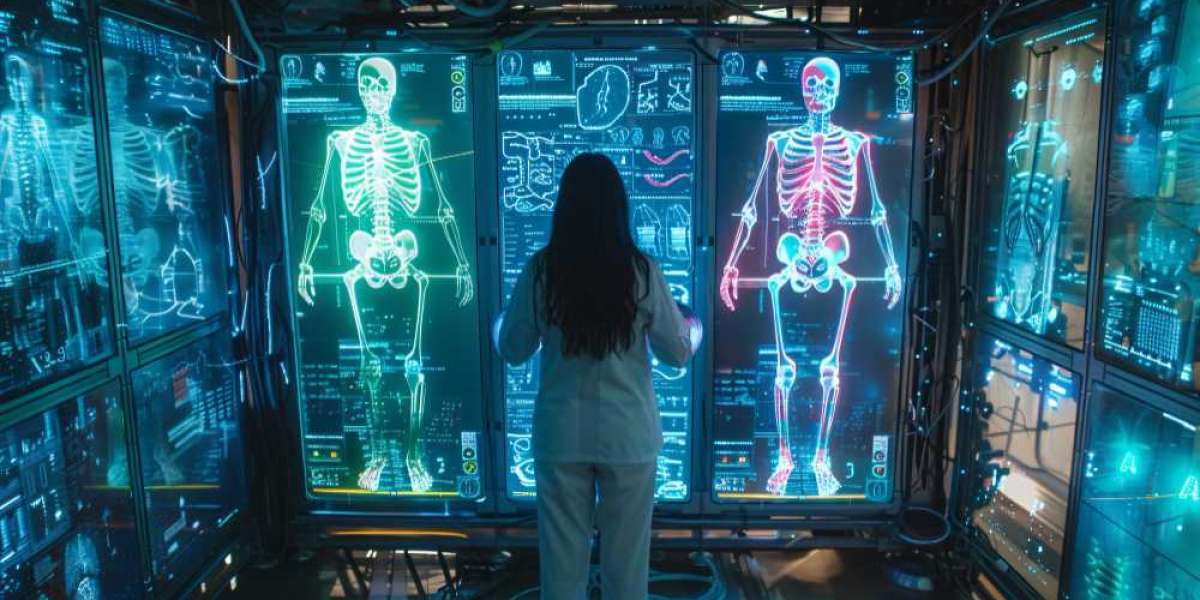Key Applications of Artificial Intelligence in Healthcare
- AI-Based Symptom Checkers One of the most promising applications of AI in healthcare is the development of AI-based symptom checkers. These digital tools use machine learning algorithms to assess a patient's symptoms, medical history, and other factors to provide potential diagnoses or suggest next steps for treatment. AI-powered symptom checkers help reduce the burden on healthcare providers, streamline patient triage, and provide patients with immediate, reliable information. Companies like Babylon Health and Ada Health are making significant strides in this area, offering healthcare solutions that are accessible 24/7.
- Diagnostic Imaging and Analysis AI is revolutionizing the field of medical imaging by enabling faster and more accurate interpretations of X-rays, MRIs, CT scans, and other diagnostic imaging techniques. AI algorithms, particularly deep learning models, can detect abnormalities such as tumors, fractures, and other signs of disease more accurately than human doctors in some cases. Tools like Google’s DeepMind and IBM Watson Health are already being used in hospitals to improve diagnostic accuracy and speed.
- Personalized Medicine The use of AI in personalized medicine is one of the most exciting areas in healthcare. AI models analyze data from patients' genetic profiles, lifestyle factors, and medical histories to recommend individualized treatments tailored to each patient’s unique needs. This approach ensures that therapies are more effective and minimize adverse reactions. AI-driven genomics platforms, like those from Tempus and PathAI, are enabling healthcare providers to make more informed decisions based on personalized data.
- Predictive Analytics for Disease Prevention AI is increasingly being used for predictive analytics to identify patients at risk of developing chronic diseases, such as diabetes, cardiovascular disease, and certain types of cancer. By analyzing patient data, lifestyle habits, and genetic predispositions, AI algorithms can predict the likelihood of disease development, enabling early intervention and preventive measures. This capability improves the efficiency of healthcare systems by reducing hospital readmissions and managing healthcare resources more effectively.
- Robotic Surgery Robotic surgery, powered by AI, is improving surgical outcomes through greater precision and minimally invasive techniques. AI applications in robotic surgery allow for real-time monitoring, better precision, and enhanced decision-making during procedures. Robotic systems, such as those developed by Intuitive Surgical (da Vinci Surgical System), are already used in a variety of surgeries, including urology, gynecology, and cardiology, offering patients quicker recovery times and reduced complications.
- Drug Discovery and Development AI is significantly accelerating the process of drug discovery and development, helping pharmaceutical companies bring drugs to market faster and at a lower cost. AI algorithms analyze vast amounts of biological data to identify potential drug candidates, predict their efficacy, and simulate clinical trial outcomes. Companies like Insilico Medicine and BenevolentAI are using AI to uncover novel drug molecules, potentially revolutionizing the development of treatments for complex diseases such as Alzheimer’s, cancer, and rare genetic disorders.
- Virtual Health Assistants AI-powered virtual assistants are becoming common tools for enhancing patient engagement and providing real-time support. These systems interact with patients through voice or text, offering reminders for medication, managing appointments, and providing health-related advice. Virtual assistants can also monitor a patient’s condition and alert healthcare providers if necessary. These systems improve patient compliance and help reduce the workload of healthcare professionals by providing continuous monitoring.
- Clinical Decision Support Systems (CDSS) Clinical decision support systems (CDSS) powered by AI assist healthcare providers in making informed decisions regarding patient care. By analyzing patient data, historical medical records, and evidence-based guidelines, AI can recommend the best course of action, such as treatment options, medications, or lifestyle changes. These systems reduce human error, improve patient outcomes, and streamline clinical workflows. AI-driven CDSS tools, such as IBM Watson for Oncology, are already being used to support doctors in diagnosing and treating cancer.
- AI in Mental Health Care The potential of AI in mental health care is gaining recognition, particularly through chatbots and AI-based therapy platforms that offer support for mental health conditions such as depression, anxiety, and PTSD. AI applications in this area include cognitive-behavioral therapy (CBT) delivered via virtual assistants, mental health screening tools, and emotion analysis from speech or text. AI-enabled tools, like Woebot and Tess, provide mental health support in a scalable, accessible, and cost-effective manner.
- AI in Remote Patient Monitoring Remote patient monitoring (RPM) solutions powered by AI allow healthcare providers to track patients' health metrics in real time, enabling proactive care management. Wearable devices, such as smartwatches and fitness trackers, collect data on vital signs like heart rate, blood pressure, and oxygen levels. AI analyzes this data to detect abnormalities and predict health issues, allowing for timely intervention and reducing hospital admissions.
Challenges and Considerations
Despite its promising potential, there are several challenges in the widespread implementation of AI applications in healthcare:
- Data Privacy and Security: The use of AI in healthcare involves the processing of sensitive patient data, raising concerns about data privacy and security. Compliance with regulations such as HIPAA (Health Insurance Portability and Accountability Act) and GDPR (General Data Protection Regulation) is essential.
- Integration with Existing Systems: Many healthcare systems are not equipped to fully integrate AI technologies. Ensuring seamless integration between AI systems and legacy healthcare infrastructure is crucial for maximizing the benefits of AI.
- Bias and Equity: AI algorithms are only as good as the data they are trained on. There is a risk that biased data may lead to inaccurate diagnoses or treatment recommendations, potentially exacerbating health disparities.
- Regulatory Approval: AI technologies in healthcare must undergo rigorous regulatory scrutiny before they can be implemented in clinical practice. The approval process for AI-powered medical devices and treatments is complex and varies by region.
Conclusion
The global market for AI in healthcare is on the brink of significant transformation, with AI applications in diagnostics, treatment planning, patient engagement, and research offering substantial benefits for both healthcare providers and patients. The integration of AI-based symptom checkers, personalized medicine, drug discovery, and robotic surgery is revolutionizing healthcare, making it more efficient, accurate, and accessible. While challenges exist, such as data privacy concerns and integration hurdles, the continued evolution of AI in healthcare promises to reshape the future of medicine, improving both outcomes and patient experiences.
Latest Reports Offered By DelveInsight:
- Insights Into The Cutaneous T-cell Lymphoma Treatment Market
- Roche’s HEMLIBRA: A Game Changer in Hemophilia A Treatment Landscape
- Emerging Role of Digital Health in the Field of Oncology
- How Will Emerging Therapies Drift the Amyotrophic Lateral Sclerosis (ALS) Treatment Landscape
- How are Technological Trends and Innovations Reshaping the Dementia Care
More Reports
Healthcare Partner Identification Services | Cardiorenal Syndrome Market | Vascular Access Devices Market | Cerebral Vein Thrombosis Market | Dermal Erythema Market | Polypoidal Choroidal Vasculopathy Market | Bone Densitometers Market | Intracranial Pressure Monitoring Devices Market | Acoustic Neuroma Market | Neurovascular Devices Market | Ophthalmic Imaging Equipment Market | Neurostimulation Devices Market | Radioligand Therapies Market | Alopecia Areata Market | Brain Aneurysm Stents Market | Necrotizing Enterocolitis Market | Angioedema Market | Arthroscopic Shavers Market | Automated External Defibrillators Market | Catheter-related Bloodstream Infections Market | Chronic Hepatitis B Virus Market | Fuchs Dystrophy Market | Hearing Implants Market


